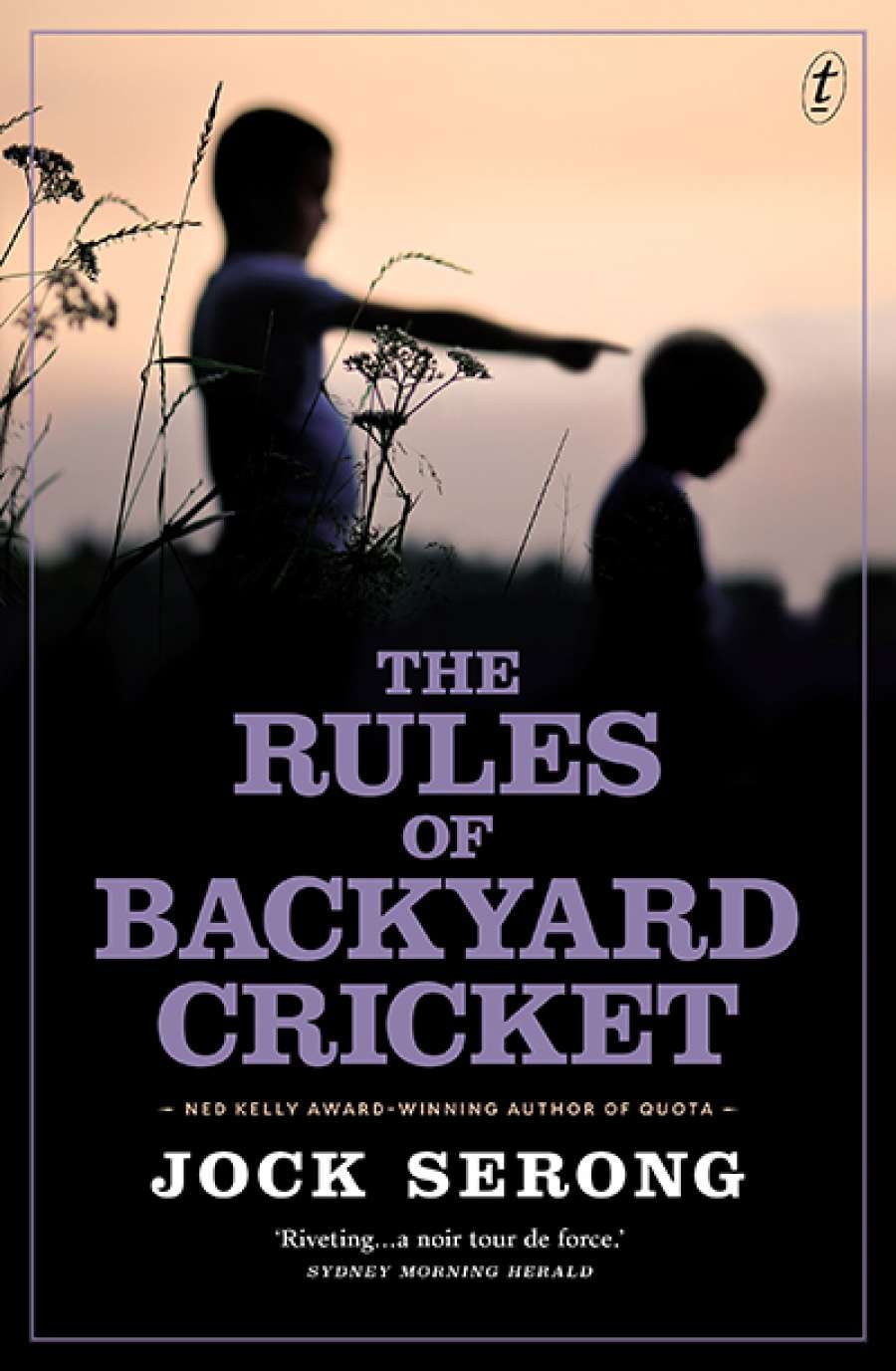
- Free Article: No
- Contents Category: Fiction
- Custom Article Title: Craig Billingham reviews 'The Rules of Backyard Cricket' by Jock Serong
- Custom Highlight Text:
Rain delays at sporting events are not reserved exclusively for reading Australian literature, which I think is a great shame. For example, in July 2016, Alex James, a cricket fan from ...
- Book 1 Title: The Rules of Backyard Cricket
- Book 1 Biblio: Text Publishing $29.99 pb, 304 pp, 9781925355215
In The Rules of Backyard Cricket, the larrikin in question is Darren Keefe, the novel's first-person narrator. Darren is a prodigiously talented Victorian batsman, 'a force of nature: a talented freak with no mooring'. Success comes early, but, just as clouds have silver linings, Darren's balloon is peppered with targets; throughout, it seems he can't get out of his own way. Alcohol, recreational drugs, and a wayward friend called Craig: these are ominous signs indeed. For the most part, Darren's scrapes do not test our credulity, possibly an indictment of contemporary sport. It is giving little away to say the novel starts with Darren in the boot of a car, gagged, cable-tied, and bleeding. That we have to wait until the end to learn how he got there, and whether he will manage to extricate himself, adds the thriller tag to an otherwise literary novel.
The sense of Darren teetering on the brink is contrasted with the smooth sailing of his older brother, Wally, also a professional cricketer, who is described as 'responsible, grave: a leader'. The intimacy and the antagonism are pronounced; Darren and Wally regularly knock chunks out of each other and then proceed to pick at the scabs, as brothers will, but there are also quieter moments of empathy and communication. The relationship of one brother to another – how they respond to events, how they move together and apart, and the rewards each is fated to enjoy – gives the novel its buoyancy.
But of Darren's potential 'moorings' it is his mother, who for the most part brought up two children as a single parent, and also Hannah, his niece, to whom he seems most emotionally connected. The relationships are well drawn, culminating in real tenderness in the final third of the novel, when so much else is unravelling. If Darren could have steadied himself, we feel, it would have been for the benefit of one of these two women.
 Jock SerongReminiscent of Malcolm Knox's A Private Man (2004), which also featured a professional cricketer, the subject under investigation in The Rules of Backyard Cricket is a recognisable variant of the Australian male: white, laconic, barrel-chested, hands shaped by long exposure to bats and balls and beer bottles. The female characters largely symbolise innocence and sacrifice, and their involvement is ultimately in the service of Darren or Wally's story. As a microcosm of mainstream Australia from the 1970s onwards, The Rules of Backyard Cricket is both satire and lament; it does little for national pride, sporting or otherwise.
Jock SerongReminiscent of Malcolm Knox's A Private Man (2004), which also featured a professional cricketer, the subject under investigation in The Rules of Backyard Cricket is a recognisable variant of the Australian male: white, laconic, barrel-chested, hands shaped by long exposure to bats and balls and beer bottles. The female characters largely symbolise innocence and sacrifice, and their involvement is ultimately in the service of Darren or Wally's story. As a microcosm of mainstream Australia from the 1970s onwards, The Rules of Backyard Cricket is both satire and lament; it does little for national pride, sporting or otherwise.
Alongside his freakish talent as a batsman, Darren Keefe also has a gift for lyricism. Attending the funeral of a dementia sufferer, he says: 'I know the casket's over-generous, because in the end there was so little of her, as though the departing memories took the flesh off her bones as they went.' Later he reflects: 'We rationalise the inexplicable because we don't like it occupying that infirm ground in our hearts.' He watches a man in a café as he 'sheafs through the papers with the air of a bored factotum'.
In the examples cited, and there are others, there is a misalignment between the sophistication of the prose and the character of the narrator; it is Jock Serong we hear, not Darren Keefe. This was not a problem in Serong's first novel, Quota (2014), which employed third-person narration to good effect. In Quota, Serong could range more broadly, from Melbourne barristers to small-town fishermen, finding the appropriate register as he went; for Darren Keefe, the intrusion of the novelist's 'voice' on occasion obscures the consciousness Serong is attempting to portray.
On the whole, I enjoyed The Rules of Backyard Cricket, and I will look out for Serong's next book. In preparation for the inevitable rain delay, Alex James might do the same.


Comments powered by CComment